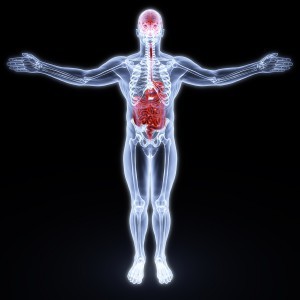If you’ve seen a health professional (or professionals) for depression and no one has asked you the question: “Are you regular?”, you need to understand how having a healthy bowel is related to your mood. (Aside from the fact that having irregular bowel movements is uncomfortable).
 I learned about the connection in 2008. I was taking a low dose of an antidepressant (prescribed to me during my teen years) that I was trying to wean off of, and went to see a naturopathic doctor.
I learned about the connection in 2008. I was taking a low dose of an antidepressant (prescribed to me during my teen years) that I was trying to wean off of, and went to see a naturopathic doctor.
He asked me how often I passed a bowel movement. I explained I was constantly irregular: “Sometimes I only go once a week!” I told him. He explained that the situation was problematic and was likely causing my depressed mood. He prescribed me a combination of healthy bowel supplements, which I took by mouth. I started having daily bowel movements. My mood improved and I was able to discontinue my antidepressants. At the time, I never felt happier.
Your digestive system impacts your mood
Did you know, your body has two brains?
Your gut is the component of your digestive track that allows your body to digest food and process it into waste and eliminate it, by sending it out your anus.
What most people don’t know about the gut is that it works independently. It’s the only organ that works without being controlled by your cranial brain (the one inside your skull). That means, it’s also wired with a network of neurons (brain cells). There are approximately 400 to 600 million neurons in your gut.
For this reason, the gut is commonly called the “second brain” or “gut brain”. And it’s pre-empted a new school of research called neurogastroenterology.
How the cranial brain and gut brain interact
Your gut brain manufactures approximately 30 neurotransmitters (brain chemicals). It talks to the brain in your head, your cranial brain, by sending messages through a region at the based of your brain that extends to abdomen, called the vagus nerve.
Your gut brain sends signals to your cranial brain that affect feelings of sadness, stress and that influence your thinking processes. Both brains produce the neurotransmitter (chemical messenger) serotonin. And get this: Your gut produces 95 percent of all the serotonin in your body. Your guts also makes 50% of the dopamine (another feel good brain chemical) in your body.
So, are you regular?
Frequency: Are you passing a bowel anywhere from 1-3 times a day. These averages suggest a normal range, though some individuals go slightly less (3-5 times per week) and some go more (up to 4 times per day). As you long as you are going at least every other day and you feel comfortable (you’re not dealing with stomach pain or discomfort) it’s likely not affecting your mood.
Appearance: Your bowel movements should be a shade of brown. They are brown because your liver produces a substance called bile, which helps your body break down and eliminate food. If your stool (your poop) is black or has red in it, you may have blood in your stool. This may suggest other serious illnesses.
Last thoughts on bowel health
If you are irregular, you’ll want to tell your doctor. You’ll be able to learn of ways that you can get your bowels back in working order. To learn more about the connection between your brain and gut check out the book Second Brain by Michael Gershon.
And if you’d like to discover other issues that could be affecting your mood, or learn about therapies that can help you, grab a copy of the book: Read This Before You Kill Yourself.
 What is a health advocate?
What is a health advocate?